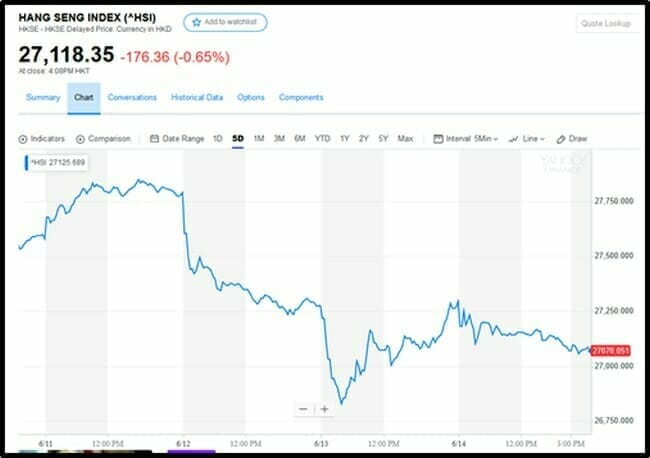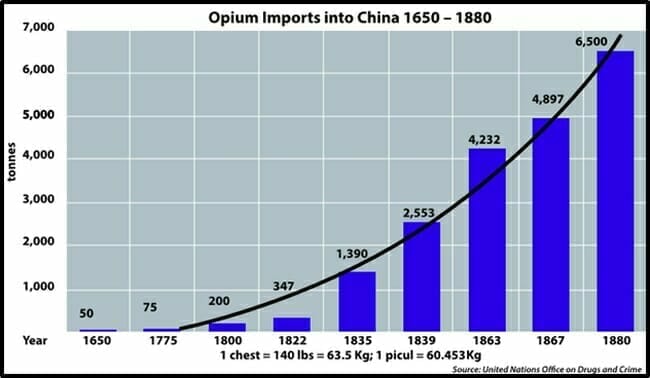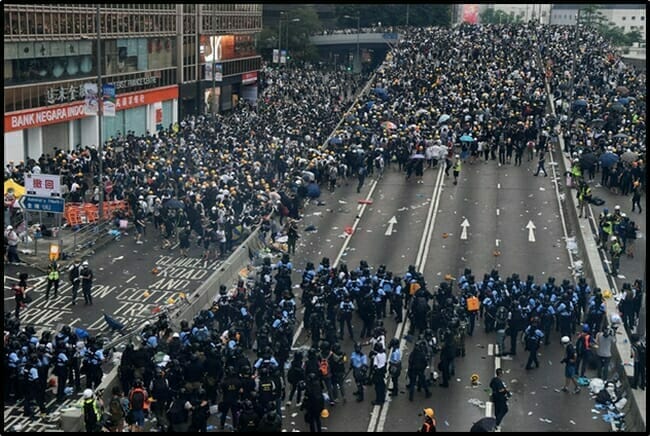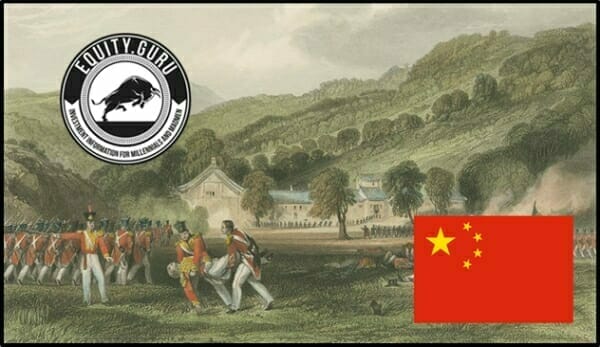This week, there was sustained rioting on the streets of downtown Hong Kong (HK), as agitated locals protested a controversial bill allowing China to extradite suspected criminals from Hong Kong to mainland China.
5,200 HK riot police fired tear gas and rubber bullets at the protesters – injuring 85 people – with two in serious condition in a Hong Kong hospital.
Critics say that anyone – including foreigners – could be extradited from Hong Kong for political reasons or business offenses. That could be a problem for crooked international bankers.
If HK loses its status as an investment safe haven, there will be an exodus of expats and financial workers. The HK company, Wharf Real Estate Investment fell 5% this week. Hong Kong inter-bank borrowing costs spiked.
After surging 2.3% at the start of the week amid monetary policy optimism, the Hong Kong Hang Seng Index slumped about 2.5% – as daily riots continued.

To the foreign eye, the extradition bill may look like classic Beijing-bullying. But the pertinent subplots echo back a couple of millennia.
Hong Kong was first incorporated into China during the Qin dynasty in 243 BC. It remained under Chinese control for the next 2,000 years
In the 19th Century the English got a hard-on for Chinese tea. China forced the Brits to pay for its tea habit with precious metals.
Queen Victoria was a gold-hoarder. Despite her predilection for tea, she hated to see precious metals float across the ocean. The Queen, backed by the English parliament, decreed that the UK would smuggle opium out of British-colonized India to China – and pay for tea with black market opium.
China already had lot of opium addicts. Many of them suffered from Narcotic Bowel Syndrome. Other Chinese opium addicts refused to work or make love to their wives (both activities were considered national duties).
In 1839, Chinese officials destroyed 20,000 bales of opium. Britain declared war to protect its illegal drug biz.

The First Opium War (1839 – 1842) was waged.
The British had a significant technological advantage.
Chinese War Junks were equipped with matchlock muskets, only accurate to 150 feet.
Equipped with Naval steam ships, heavy cannon, Congreve rockets and long-range rifleman, the Brits quickly tore the Chinese a new asshole. Editor’s note: the Chinese don’t forget this stuff.
China lost the war and was forced to hand over Hong Kong to the Brits, making it a UK crown colony. On June 9, 1898, the British signed a deal with the Chinese to lease Hong Kong for 99 years.
“People loved Hong Kong because it was China, but it wasn’t China,” stated one China expert, “If Hong Kong is going to become more like China, investors will look elsewhere.”
In 1984, British Prime Minister Margaret Thatcher (“The Iron Lady”) and Chinese Premier Zhao Ziyang negotiated a plan for the lease to end, keeping Hong Kong as a “semi-autonomous region” for a 50-year period.
After the hand-over, the “one country, two systems” plan went relatively smoothly for the first decade. Since then, tensions between democratically-minded Hong Kong residents and the Beijing government – have escalated.

First, Beijing tried to introduced “patriotic” (pro-China) themes into the HK elementary schools. Then Xi Jinping was made party boss, and given even greater powers. In 2014, there was massive demonstration over growing Beijing influence in Hong Kong.
“We had always realised that an extradition agreement with China would drive a stake into the heart of “one country, two systems”, wrote Chris Patten, the final British governor of Hong Kong (1992-97) this week in a Guardian Op-Ed, “For China, what is at stake is whether in future the rest of the world will be able to trust it to keep its word.”
China controlled HK for 20 times longer than the Brits.
If you owned a car for 20 years, then lent it to a menacing associate for one year, after he returned it – would you want him telling you how to drive it?
That’s how the Chinese look at the situation in Hong Kong.
They have zero intention of giving it back, or allowing new-fangled foreign ideas like “democracy” and “free speech” to pollute the fragrant atmosphere of this glorious sub-tropical Chinese island.
Last year, the Brits imported about 1,920 tonnes of Chinese green tea.
These dentally-challenged tea-drinkers are the descendants of the original thirsty bastards who ignited this whole problem.


Leave a Reply